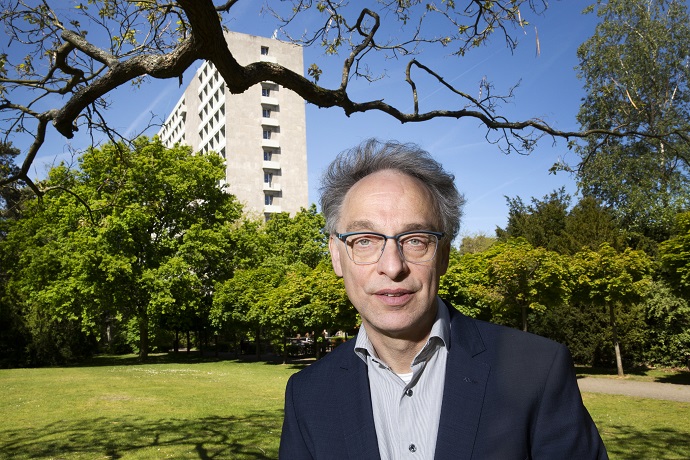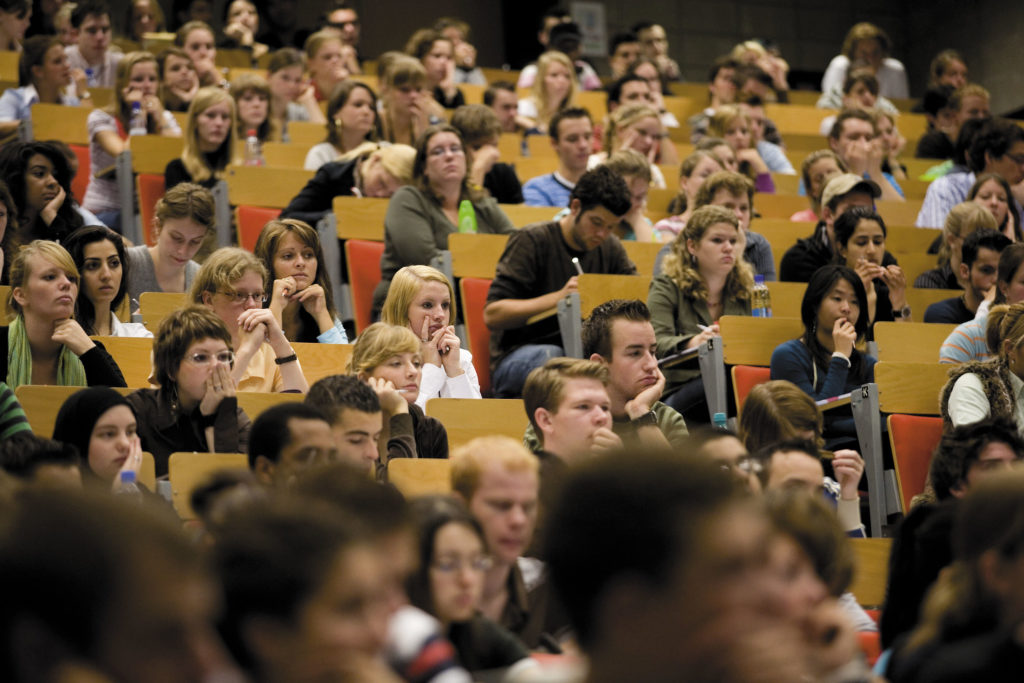Boudewijn Haverkort on internationalization: ‘Government interferes too much with universities’
Boudewijn Haverkort, Dean of Tilburg School of Humanities and Digital Sciences, is concerned about the Hague’s plans to combat anglicization in education: ‘I think it is important to train students for Europe.’

During the last School Board meeting of the Tilburg School of Humanities and Digital Sciences, you passionately addressed all those present at the meeting. You asked them to convey that the university is an open and welcoming place for international students and staff. Why did you feel it was important to emphasize that?
‘First of all, I am convinced that the university is a place where people with different views and from different cultures should come together. This is enormously important especially in this day and age. Social problems and challenges are not limited to national borders. As a university, you must therefore embrace the world and work with people from all over the world. Only in this way can you truly understand society and better address problems.
‘In addition, I think it is important to reach out to the international community. TSHD —like other faculties at the university—has a large group of international employees. They relocated here with hearth and home and were brought in for a reason: they are experts who understand their profession, and they contribute significantly to our curricula and society. You have to treat them with care. That they are now suddenly seen as problematic is something I find hard to digest.
‘This also applies to international students. Some time ago, I read an article in the NRC (in Dutch) about the migration debate. These students are suddenly seen as part of the ‘migration problem.’ That’s an unfavorable development.’
Why do you think this is an unfavorable development?
‘In the Netherlands there are many universities that offer very good services: we have fantastic educational programs and do excellent scientific research. Not only Dutch students but also students from abroad take advantage of this. Students from outside the European Union pay a fee for this and thus make their financial contribution. However, I do think that we should take another good look at the level of these fees so that we can be sure that they are reasonable.
‘In addition to Dutch students and students outside the European Union, we also welcome EU students. It would be very strange to keep these students out. The European Union has made agreements about the free movement of people and goods. If you, as a Dutch university, circumvent those rules, something is wrong. Moreover, Dutch students are free to study abroad. Partly for this reason, it feels very uncomfortable not to welcome international students.’
What are the Hague’s plans against anglicization?
Outgoing Minister Dijkgraaf wants Bachelor’s programs to be largely taught in Dutch starting from the academic year 2025-2026: up to one-third of the courses may be taught in another language. This applies only to Dutch-taught Bachelor’s programs.
Courses in another language such as English remain possible—as they are now. But universities that want to offer a new Bachelor’s program entirely in another language must seek approval from the ministry.
Is it also a prestige issue?
‘The signal the Dutch government is currently sending is detrimental for the image of Dutch universities abroad. A few weeks ago, I had the pleasure of sitting next to the ambassador of Switzerland at a dinner. We were talking about the high-quality universities of Zurich and Lausanne. I asked him why exactly Swiss universities are so good. He gave two main reasons.
‘First of all, there is little government interference in Switzerland. In addition, the universities are open to the outside world: they gladly welcome international students and staff. That is exactly what is not happening in the Netherlands at the moment. The Dutch government interferes too much in the internal affairs of the university.’
In The Hague, politicians have long been concerned about the anglicization of education. For example, English-taught education is said to be detrimental for Dutch language skills, while many Dutch students find Dutch-speaking jobs in the Netherlands after their studies. Also, many international students leave the Netherlands after their studies. How do you view this?
‘In the Netherlands we have an agreement that you can study at university if you have a VWO diploma. At the VWO you learn Dutch and English. Most university curricula and final attainment levels say nothing about language requirements. I find it extraordinary that the government is suddenly interfering with this. By the way, we could well improve the language level of students. For example, by adding compulsory English and Dutch classes to the curriculum.
‘But then you run into some other problems. For example, if you add certain courses—such as mandatory language classes—to a curriculum, other courses have to be removed. It also becomes difficult to find lecturers who can offer these courses. Imagine if every student had to take Dutch: where would the university get the lecturers? Right now there are not even enough Dutch teachers for secondary school.’
Still, some students complain about the language level. For example, some students feel inhibited because the language prevents them from going in depth during class discussions. Even though there are hardly any international students present. How do you view this?
‘Maybe sometimes I underestimate this issue. That also has to do with my own background as an engineer where, in an international context, you still have the common language of mathematics. I can imagine that in study programs like philosophy or cultural studies, you need the depth of language.
‘As far as I am concerned, the plans from The Hague are a reason to take a critical look at our own School. We have English-taught study programs at this university where the number of international students is well below ten percent. Then the question is: how effective is it to teach in English? We also must be willing to introspect and ask ourselves how we can do things differently. But as the plans stand, the nuance seems to be lacking.’

What do TSHD students really need the internationalism in their education for?
‘I think it is important to train students for Europe. Graduates go to work in large companies or institutions that work and think across borders. For example, if you look at students from the Department of Cognitive Science and Artificial Intelligence, you see that they mostly end up in technical professions and find a job at a company where English is the working language.
‘But also students who end up in policy-related professions after their studies will find that Brussels’s role is not diminishing. An international orientation during your studies is very important for these students.’
Not only because of the language level but also because of the housing shortage, politicians in The Hague want to welcome fewer international students to the Netherlands. With these plans, they hope to reduce the shortage on the (student) housing market. Yet the university continues to propagate that it is an open and welcoming place for international students and staff. Does this not ignore the housing problem?
‘I absolutely do not want to ignore or trivialize that problem. There is obviously something wrong with the housing market in the Netherlands and that needs to be addressed. But coming up with ‘selective’ solutions, such as banning international students, is not a solution.
‘Moreover, such questions are not asked of a company like ASML that houses all kinds of people in Veldhoven. I absolutely don’t want to be critical of ASML, but unlike universities, large companies around Eindhoven and the Randstad region are not challenged on their international character. They are not told to stop recruiting international employees.’
So is there nothing the university could do? As it is, students have little money and struggle to find housing. Adding more students from abroad will not make the search for housing any easier.
‘The university is limited in what it can do. But I do think that, as a university, we have to look for opportunities and be creative. The Executive Board is in constant dialogue with the Municipality of Tilburg and housing associations to ensure that student housing is added.
‘I have also occasionally suggested that we could create a housing plan together with alumni from this university. We have many former students who are in good socioeconomic circumstances. Maybe they would find it interesting to contribute to a student housing project. Not as a commercial investment, but as a social investment.’
The interview with Boudewijn Haverkort is a personal interview. He does not necessarily represent the views of Tilburg University or TSHD.
Translated by Language Center, Riet Bettonviel






